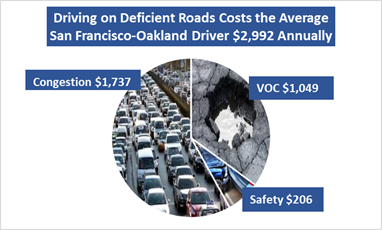FOR IMMEDIATE RELEASE
Wednesday, August 15, 2018
Report available at: tripnet.org
Contact: Rocky Moretti 202.262.0714 (cell)
Carolyn Bonifas Kelly 703.801.9212 (cell)
TRIP office 202.466.6706
SAN FRANCISCO-OAKLAND AREA DRIVERS LOSE NEARLY $3,000 PER YEAR ON ROADS THAT ARE ROUGH, CONGESTED & LACK SOME SAFETY FEATURES – $61 BILLION STATEWIDE. A LACK OF ADEQUATE FUNDING WOULD LEAD TO FURTHER ROAD & BRIDGE DETERIORATION, INCREASED CONGESTION AND HIGHER COSTS TO MOTORISTS
Eds.: The statewide report includes regional pavement conditions, bridge conditions, congestion levels, highway safety data, and cost breakdowns for the Bakersfield, Central Valley, Chico-Redding, Concord, Fresno-Madera-Visalia-Hanford, Los Angeles, Riverside-San Bernardino, Sacramento, San Diego, San Francisco-Oakland, San Jose and Santa Barbara-Santa Maria-San Luis Obispo urban areas.
San Francisco, Calif.– Roads and bridges that are deteriorated, congested or lack some desirable safety features cost each San Francisco-Oakland driver $2,992 per year – a total of $61 billion statewide- due to higher vehicle operating costs, traffic crashes and congestion-related delays. Adequate investment in transportation improvements at the local, state and federal levels is needed to relieve traffic congestion, improve road, bridge and transit conditions, boost safety, and support long-term economic growth in California, according to a new report released today by TRIP, a Washington, DC based national transportation research organization.
The TRIP report, “San Francisco-Oakland Transportation by the Numbers: Meeting the Region’s Need for Safe, Smooth and Efficient Mobility,”finds that throughout California, more than two-thirds of major locally and state-maintained roads are in poor or mediocre condition and 1,603 of 25,657 locally and state-maintained bridges (20 feet or longer) are structurally deficient. The report also finds that California’s major urban roads are becoming increasingly congested, causing significant delays and choking commuting and commerce.
Driving on San Francisco-Oakland area roads costs the average driver $2,992 annually in extra vehicle operating costs (VOC) as a result of driving on roads in need of repair, lost time and fuel due to congestion-related delays, and the costs of traffic crashes in which roadway features likely were a contributing factor.

The TRIP report finds that 87 percent of major locally and state-maintained roads in the San Francisco-Oakland area are in poor or mediocre condition, costing the average motorist an additional $1,049 each year in extra vehicle operating costs. These costs include accelerated vehicle depreciation, additional repair costs, and increased fuel consumption and tire wear. Driving on rough roads costs the state’s drivers a total of $22.1 billion each year.
Traffic congestion in the San Francisco-Oakland area is worsening, causing 80 annual hours of delay for the average motorist and costing the average driver $1,737 each year in lost time and wasted fuel. California drivers lose a total of $29.1 billion annually in the form of lost time and wasted fuel due to congestion.
More than half – 56 percent – of California’s bridges are at least 50 years old – the eighth highest rate in the nation. In the San Francisco-Oakland area, 77 of 1,343 bridges are structurally deficient, with significant deterioration to the bridge deck, supports or other major components. This includes all bridges that are 20 feet or more in length.
Traffic crashes in California claimed the lives of 15,730 people over the last five years. California’s overall traffic fatality rate of 1.07 fatalities per 100 million vehicle miles of travel is lower than the national average of 1.18. The fatality rate on California’s non-interstate rural roads is approximately four and a half times higher than on all other roads in the state (3.48 fatalities per 100 million vehicle miles of travel vs. 0.76). In the San Francisco-Oakland area, on average, 162 people were killed in traffic crashes each year from 2014 to 2016. The financial impact of traffic crashes costs each San Francisco-Oakland driver an average of $206 annually – a total of $9.8 billion statewide.
The efficiency and condition of California’s transportation system, particularly its highways, is critical to the health of the state’s economy. Annually, $2.8 trillion in goods are shipped to and from sites in California, mostly by trucks, relying heavily on the state’s network of roads and bridges. Increasingly, companies are looking at the quality of a region’s transportation system when deciding where to re-locate or expand. Regions with congested or poorly maintained roads may see businesses relocate to areas with a smoother, more efficient and more modern transportation system. Approximately 7.1 million full-time jobs in California in key industries like tourism, retail sales, agriculture and manufacturing are completely dependent on the state’s transportation network.
Investment in California’s roads, highways and bridges is funded by local, state and federal governments. In April 2017, the California legislature enacted SB 1 — the Road Repair and Accountability Act. SB 1 increased state revenues for transportation by increasing the state’s gasoline and diesel taxes, implementing a transportation investment fee on vehicles and initiating an annual fee on zero emission vehicles. It is estimated that SB 1 will increase state revenues for California’s transportation system by an average of $5.2 billion annually over the next decade.
“Driving on deficient roads comes with a $2,992 yearly price tag for San Francisco-Oakland area motorists – $61 billion statewide,” said Will Wilkins, TRIP’s executive director. “Adequate funding for the state’s transportation system would allow for smoother roads, more efficient mobility, enhanced safety, and economic growth opportunities while saving California’s drivers time and money.”